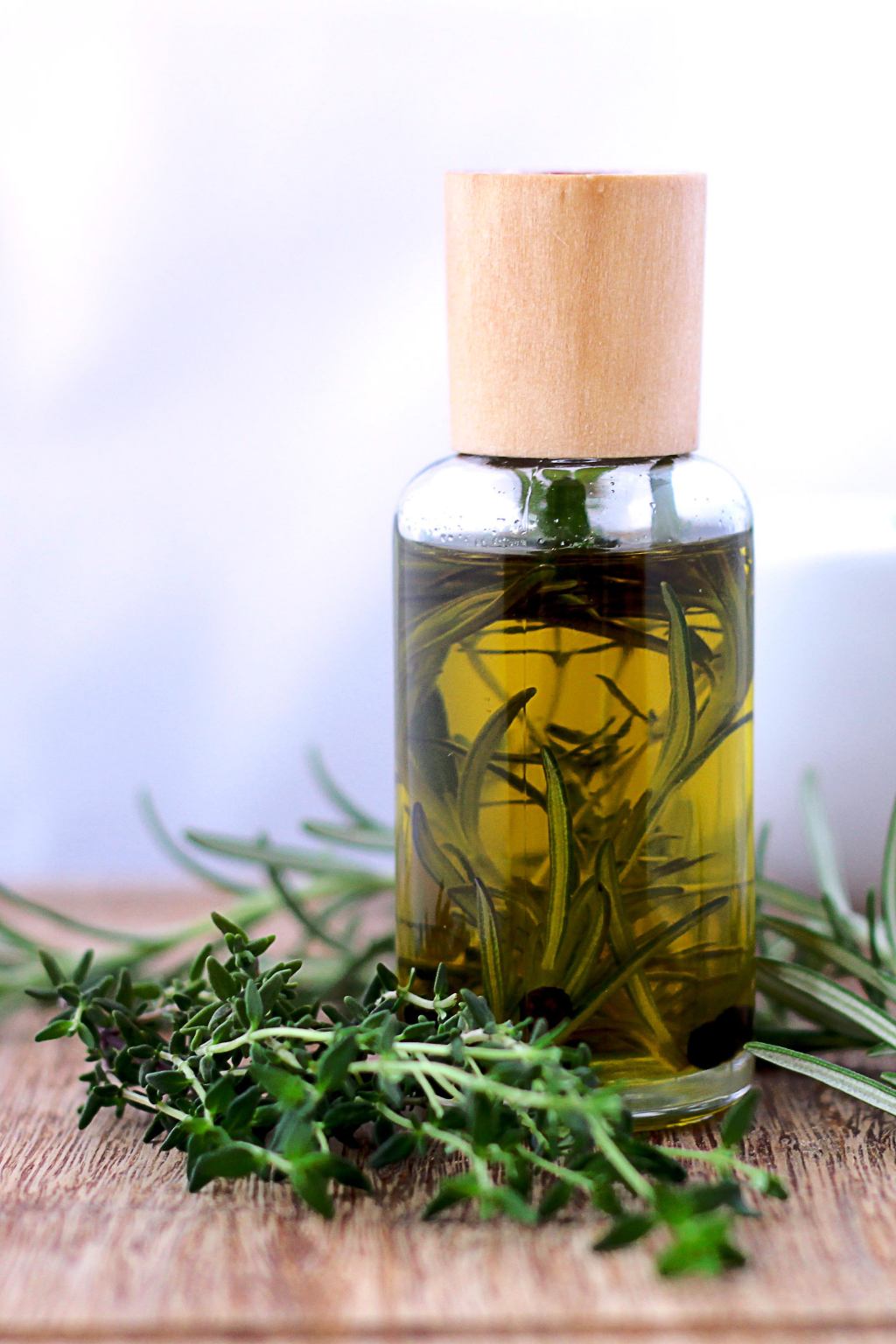Thyme oil has been recognized for its various benefits throughout the Mediterranean for thousands of years. It has been used for its antiseptic, antibacterial, antispasmodic, hypertensive, and calming properties. Thyme oil is one of the most powerful antioxidants and has been utilized as a medicinal herb since ancient history.
Thyme has many uses, it supports many of our body’s systems including the immune, nervous, digestive, and respiratory systems. It has demonstrated benefits for balancing hormones, as well as helping women manage their menstrual and menopausal symptoms. Thyme helps protect the body from ailments such as arthritis, stroke, fungal and bacterial infections, and skin conditions (Ruggeri, 2017).
Thyme Oil Benefits
Thyme Oil for Respiratory Conditions
The thyme herb and oil have been used throughout history for the treatment of symptoms of respiratory conditions such as bronchitis, upper respiratory tract infections, or simply a cough associated with a cold. It can aid your body in clearing mucus and phlegm from the nasal passage and provide relief from chest congestion. Because thyme is innately soothing, it helps treat a dry, irritated throat. It is a great natural remedy for asthma, sinus infections, headaches, and pharyngitis (Basu, 2022; Kowalczyk et al., 2020).
A common cold is caused by over 200 varying viruses which attack the upper respiratory tract. The common cold can be caused by a weakened immune system, emotional stress, lack of sleep, or a suffering digestive tract (Ruggeri, 2017).
Thyme oil has the ability to reduce anxiety, kill infections, purify the body of toxins, and even treat insomnia, making it a valuable remedy for the common cold.
Thyme Oil for Bacteria and Infections
Thyme oil is a natural antiseptic and has the ability to kill infections superficially or within the body. Additionally, it is antibacterial and inhibits the growth of bacteria, giving it the potential to treat bacterial and intestinal infections, as well as heal wounds that have been exposed to bacteria (Ruggeri, 2017).
According to a study conducted by the Center for Studies of Animal and Veterinary Sciences, thyme oil, even in low concentrations, demonstrated potential as a natural preservative for food products against multiple foodborne bacteria that can cause human ailment. Another study observed that thyme oil was successful in fighting against resistant strains of E.coli, Pseudomonas, Staph, and Enterococcus (Sienkiewicz et al., 2011; Silva et al., 2013).
Thyme oil can also be effective in treating parasitic infections. It is a vermifuge, meaning it kills dangerous intestinal worms. It can be used to treat tapeworms, hookworms, roundworms, and maggots that flourish in open sores (Ruggeri, 2017).
Thyme Oil for Skin
Due to its antibacterial and antifungal properties, thyme oil is beneficial for protecting the skin. It can also be used as a natural remedy for rashes; to treat acne, to relieve burns; and to heal sores, cuts, wounds, and scars.
Eczema is a skin ailment that can cause dry, itchy, cracked, and blistered skin. It can be hereditary or caused by stress, digestive issues, medications, or immune deficiencies. Thyme oil can help the digestive system by helping your body eliminate toxins, making it a natural remedy to treat eczema (Ruggeri, 2017).
Thyme oil can be used to treat acne and signs of aging such as fine lines and wrinkles. It can help prevent sun damage and promotes healthy, glowing skin. You can use thyme oil to achieve balanced, detoxified, and clearer skin (Basu, 2022).
Thyme oil can also be used to clarify hair by clearing build-up, alleviating dandruff, eliminating lice, and soothing your scalp, and preventing hair loss. It may even promote hair growth due to its stimulant properties (Basu, 2022).
Thyme Oil for Teeth
The anti-inflammatory and antibacterial properties of thyme oil make it beneficial to oral health. It helps eliminate bacteria and treat dental infections and cavities. It can also be effective in aiding bad breath, tooth decay, and plaque (Basu, 2022).
Thyme Oil for Balancing Hormones
Thyme oil has hormone balancing effects, it can help improve your body’s progesterone production. Many men and women have low progesterone which can lead to infertility, depression, PCOS, and other hormonal imbalances.
A study noted that out of 150 herbs tested for progesterone production, thyme oil is in the top six that have the greatest estradiol and progesterone binding. These findings indicate that it is a beneficial way to naturally balance hormones (Ruggeri, 2017).
Thyme Oil Uses in Everyday Life
- Kill toe fungus by adding 5 drops of thyme oil to a foot bath.
- Create a disinfectant spray by combining thyme oil, washing soda, and water.
- To clear congestion, add 3 drops of thyme oil to hot water and inhale the steam.
- Combine thyme oil, lavender oil, and witch hazel for a homemade toner.
- Add a few drops of thyme oil to your shampoo to clarify your scalp.
- Add the thyme herb to your favorite tea or boil it on its own. To enhance its disinfectant qualities, add a drop of lemon juice.
- Add a drop of thyme oil to your face wash or moisturizer.
- To treat acne, apply a wet cotton ball with a drop of thyme and tea tree oil affected areas.
- Add a couple drops of thyme oil to water to create a natural mouthwash.
- Using a q-tip or or your finger, rub thyme oil directly on your teeth and gums.
- Add a couple drops of thyme oil to your toothbrush before brushing your teeth.
Possible Side Effects
While thyme is typically safe for use, it may disrupt your digestive system. If symptoms occur, stop consuming thyme right away. In some cases, thyme may irritate skin. Before use, test the oil on a patch of skin. People who are allergic to oregano may also be allergic to thyme.
If you have a bleeding disorder, thyme can slow blood clotting. Do to this, you should also stop taking thyme two weeks before having surgery (Ruggeri, 2017).
References
Basu, S. (2022, April 28). Thyme Essential Oil: 5 Amazing Benefits of this Medicinal Herb Based Products. Net Meds. https://www.netmeds.com/health-library/post/thyme-essential-oil-5-amazing-benefits-of-this-medicinal-herb-based-products
Ruggeri, C. (2017, June 27). Thyme Oil Kills Infections, Increases Circulation, and Balances Hormones. Dr. Axe. https://draxe.com/essential-oils/thyme-oil/
Silva N, Alves S, Gonçalves A, Amaral JS, Poeta P. (2013). Antimicrobial activity of essential oils from mediterranean aromatic plants against several foodborne and spoilage bacteria. Food Science and Technology International.
https://journals.sagepub.com/doi/abs/10.1177/1082013212442198Sienkiewicz, M., Lysakowska, M., Ciecwierz, J., Denys, P., Kowalczyk, E. (2011). Antibacterial Activity of Thyme and Lavender Essential Oils. Ingenta Connect. https://www.ingentaconnect.com/search/article?option1=tka&value1=Antibacterial+activity+of+thyme+and+lavender+essential+oils&pageSize=10&index=1





Leave a comment